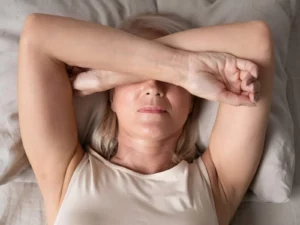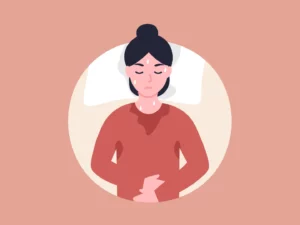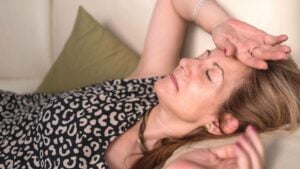Welcome to a crucial conversation about menopause and one of its most notorious companions—night sweats. For many women, the journey through menopause can be a rollercoaster of hormonal changes, hot flashes, and disruptive nights. Among these challenges, night sweats stand out as a particularly frustrating and uncomfortable symptom. In this comprehensive guide, we’ll explore the causes behind menopausal night sweats and, more importantly, discuss effective menopause night sweats treatment options and lifestyle adjustments to help you find relief.
Contents
What Causes Menopause Night Sweats?
 Menopause night sweats are a common and often disruptive symptom that many women experience during the transition into menopause. These episodes of excessive sweating, particularly during the night, can lead to discomfort, sleep disturbances, and overall reduced quality of life. Here are key factors contributing to the occurrence of night sweats during menopause:
Menopause night sweats are a common and often disruptive symptom that many women experience during the transition into menopause. These episodes of excessive sweating, particularly during the night, can lead to discomfort, sleep disturbances, and overall reduced quality of life. Here are key factors contributing to the occurrence of night sweats during menopause:
- Hormonal Fluctuations
Menopause is characterized by a natural decline in reproductive hormones, primarily estrogen and progesterone. The fluctuation and eventual decline of these hormones can disrupt the body’s temperature regulation. And, leading to sudden and intense heat episodes, often accompanied by sweating.
- Estrogen Withdrawal
Estrogen plays a vital role in regulating body temperature. As estrogen levels decrease during menopause, the body may struggle to maintain a stable internal temperature, resulting in hot flashes and night sweats.
- Sympathetic Nervous System Activation
Hormonal shifts during menopause can stimulate the sympathetic nervous system, which controls the body’s “fight or flight” response. This activation can trigger an increase in heart rate, blood pressure, and body temperature, leading to night sweats.
- Lifestyle Factors
Certain lifestyle choices and habits can exacerbate menopausal night sweats. These include smoking, excessive alcohol consumption, and a sedentary lifestyle. Additionally, consuming spicy foods and caffeine close to bedtime may contribute to increased body temperature and sweating during the night.
- Stress and Emotional Factors
Stress and emotional factors can play a significant role in the severity and frequency of night sweats. Increased stress levels can trigger hormonal imbalances and activate the sympathetic nervous system, intensifying menopausal symptoms.
Understanding the interplay of these factors provides a foundation for developing effective strategies to manage and alleviate menopause night sweats. Whether through lifestyle adjustments, medical interventions, or a combination of approaches, women can find relief and improve their overall sleep quality during this transformative phase of life.
What Are Some Menopause Night Sweats Treatment Options?
 Managing menopausal night sweats involves a combination of lifestyle adjustments, medical interventions, and holistic approaches to provide relief and improve overall well-being. Here are various treatment options to consider:
Managing menopausal night sweats involves a combination of lifestyle adjustments, medical interventions, and holistic approaches to provide relief and improve overall well-being. Here are various treatment options to consider:
Hormone Replacement Therapy (HRT)
Hormone Replacement Therapy involves supplementing the body with hormones, such as estrogen and sometimes progesterone, to address the hormonal imbalances that occur during menopause. Estrogen helps regulate body temperature, and by restoring its levels, HRT can effectively reduce the severity and frequency of night sweats. While HRT can be highly effective, it is not without risks and potential side effects. Women need to have a thorough discussion with their healthcare provider to assess the benefits and risks based on individual health factors and medical history.
Prescription Medications
In addition to HRT, certain prescription medications can be considered to alleviate menopausal symptoms, including night sweats. SSRIs and SNRIs, typically used as antidepressants, have been found to have a positive impact on reducing the frequency and intensity of hot flashes and night sweats. Clonidine, a blood pressure medication, is another option that may be prescribed for symptom relief. As with any medication, potential side effects and individual health considerations should be thoroughly discussed with a healthcare professional.
Herbal Supplements and Alternative Therapies
Some women turn to herbal supplements and alternative therapies to manage menopausal symptoms. Black cohosh, a plant-derived supplement, is commonly used for its potential to alleviate hot flashes and night sweats. Soy and flaxseed, rich in phytoestrogens, may help balance hormone levels naturally. Alternative therapies such as acupuncture and yoga have shown promise in reducing the severity and frequency of menopausal symptoms.
Mind-Body Techniques
Incorporating mind-body techniques can be instrumental in managing menopausal night sweats. Practices such as deep breathing, meditation, and mindfulness help regulate the autonomic nervous system, which plays a role in body temperature control. These techniques not only contribute to stress reduction but can also mitigate the frequency and intensity of night sweats. Biofeedback, a therapeutic technique that provides real-time information about physiological processes, empowers individuals to gain conscious control over functions like heart rate and body temperature, potentially reducing the occurrence of night sweats.
Over-the-Counter Remedies
Some women explore over-the-counter remedies, such as vitamin E supplements, to alleviate menopausal symptoms, including night sweats. Vitamin E is believed to have antioxidant properties and may contribute to the regulation of hormonal imbalances. However, it’s crucial to approach supplements with caution and consult with a healthcare professional before initiating any new regimen. The effectiveness and safety of such remedies can vary, and a personalized approach ensures that choices align with individual health needs.
Sleep Environment Optimization
Creating an optimal sleep environment is essential for managing menopausal night sweats. Using cooling fans or adjusting room temperature can help maintain a comfortable sleep climate. Investing in moisture-wicking bedding and sleepwear assists in regulating body temperature during the night, reducing the likelihood of waking up due to excessive sweating. The goal is to create a cool and comfortable sleep environment that supports uninterrupted rest.
Behavioral Changes
Implementing behavioral changes can positively impact the frequency of night sweats. Establishing a consistent nighttime routine signals to the body that it’s time to wind down, promoting better sleep. Hydration is crucial; maintaining adequate water intake helps regulate body temperature and can mitigate the impact of night sweats. Additionally, avoiding stimulants such as caffeine and engaging in relaxing activities before bedtime contribute to an environment conducive to restful sleep. These behavioral adjustments, when integrated into a daily routine, can significantly improve sleep quality during menopause.
It’s important for individuals experiencing menopausal night sweats to consult with a healthcare professional. They will them to determine the most appropriate and personalized menopause night sweats treatment plan based on their specific symptoms and medical history. Tailoring interventions to individual needs can significantly enhance the effectiveness of the chosen treatment options.
How Do You Stop Night Sweats During Menopause?
 Certainly! Here are a few practical tips to help manage and reduce night sweats during menopause:
Certainly! Here are a few practical tips to help manage and reduce night sweats during menopause:
- Cooling Bedding and Sleepwear
Invest in breathable, moisture-wicking bedding and sleepwear. Materials such as cotton or moisture-wicking fabric can help regulate body temperature and keep you cool during the night, minimizing the discomfort associated with night sweats.
- Optimize Sleep Environment
Create a cool and comfortable sleep environment by using fans or adjusting the room temperature. Keep the bedroom well-ventilated to enhance air circulation. This can contribute to better temperature regulation and reduce the likelihood of night sweats.
- Dietary Modifications
Avoid triggers that can exacerbate night sweats, such as spicy foods, caffeine, and alcohol, especially in the evening. Opt for a well-balanced diet that includes foods rich in nutrients that support hormonal balance and overall well-being.
- Hydration
Stay well-hydrated throughout the day. While it might seem counterintuitive, drinking enough water can help regulate body temperature and minimize the impact of night sweats. However, try to limit fluid intake close to bedtime to reduce the likelihood of waking up for bathroom trips.
- Regular Exercise
Engage in regular physical activity. Exercise has been shown to help regulate hormonal balance, improve sleep quality, and reduce the frequency of night sweats. Aim for activities that you enjoy, such as walking, swimming, or yoga.
- Stress Management
Practice stress-reducing techniques, such as deep breathing, meditation, or mindfulness. High-stress levels can contribute to hormonal imbalances and trigger night sweats. Incorporating relaxation practices into your daily routine can help manage stress and improve overall well-being.
Remember that individual experiences with menopause vary, so it may take some trial and error to find the combination of strategies that works best for you. These tips focus on lifestyle adjustments that can contribute to a more comfortable sleep environment and help alleviate the frequency and intensity of night sweats during menopause.
Conclusion
In conclusion, navigating menopause and its accompanying night sweats requires a multifaceted and personalized approach to reclaiming restful nights and overall well-being. From understanding the hormonal intricacies triggering night sweats to exploring diverse menopause night sweats treatment options, women have a range of tools at their disposal. Lifestyle modifications, such as optimizing the sleep environment, embracing mind-body techniques, and making dietary changes, play pivotal roles in alleviating symptoms.
By incorporating these strategies and consulting with healthcare professionals for personalized guidance, women can confidently navigate the transformative journey of menopause, finding relief from night sweats and embracing a rejuvenated, restful sleep. Through empowerment, education, and a holistic approach to self-care, women can embrace this phase of life with resilience and vitality. If you are facing menopause related issues, menopause treatment at HerMantra can help. Book your free trial online menopause treatment session now.


